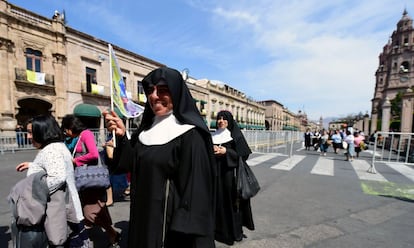Pope Francis expected to speak out against drug violence in Michoacán
The pontiff has insisted on visiting the troubled Mexican state on his five-day trip


Pope Francis is on Tuesday due to continue his five-day visit to Mexico in Michoacán, one of country’s most violent states where armed drug-trafficking groups have been fighting for years for control of the marijuana and poppy fields abundant in the fertile region.
In the same way that the pontiff has already attacked corruption and asked indigenous groups in Chiapas for forgiveness for the Church’s abuses against their culture, he is expected to speak out against the drug gang-inflicted terror that has kept Michoacán residents on edge.
Three years ago, a civil self-defense vigilante force group was formed to fight the Knights Templar Cartel, a powerful regional drug organization whose leaders’ messianic messages have also given it the air of a religious sect.
Despite more security, the violence has continued and residents still do not live in peace
Former cartel head Nazario “El Chayo” Moreno, who was killed in a shootout with authorities in March 2014, ordered chapels to be built with his image on their doors. El Chayo had also exploited the government's mistaken announcement of his death in 2010 to recruit drug addicts to bear witness to his ‘resurrection.’
The government of President Enrique Peña Nieto sent troops and federal police into the state under the supervision of one of the president’s closest aides, Alfredo Castillo, who for a time had far-reaching powers over security issues.
The Templars’ dominance was weakened by the capture or killing of many of its leaders. At the same time, a good number of the self-defense forces were legalized and joined a government-sponsored rural security unit, while the police and military took over important areas that drug traffickers had once controlled.
But the violence continued – especially in Tierra Caliente, the most troubled area of Michoacán – demonstrating that residents still do not live in peace.
It was Pope Francis who chose to go to Morelia, the state capital, during his five-day visit to Mexico
“The city you chose,” read a battery of proud signs posted on highways, buildings and other areas.
Five priests have been murdered over the past 15 years in Apatzingán
Priests in Michoacán are not immune to violence as they are in other parts of the country, where they sometimes hear the confessions of drug hit men in exchange for money to build a church or buy a vehicle.
In Apatzingán, the center of the conflict between the cartels and the self-defense forces, five priests have been murdered in the past 15 years.
One clergyman who gave authorities the names of politicians and drug traffickers who work together, Father Goyo, had to take a year-long sabbatical after he received threats.
Alfredo Gallegos, a priest of a small parish, offered Mass on Sunday armed with a revolver. During the homily, he implored for the pope’s safety.
“They told me not to think of going anywhere the pope is headed,” he told his faithful.
English version by Martin Delfín.
Tu suscripción se está usando en otro dispositivo
¿Quieres añadir otro usuario a tu suscripción?
Si continúas leyendo en este dispositivo, no se podrá leer en el otro.
FlechaTu suscripción se está usando en otro dispositivo y solo puedes acceder a EL PAÍS desde un dispositivo a la vez.
Si quieres compartir tu cuenta, cambia tu suscripción a la modalidad Premium, así podrás añadir otro usuario. Cada uno accederá con su propia cuenta de email, lo que os permitirá personalizar vuestra experiencia en EL PAÍS.
¿Tienes una suscripción de empresa? Accede aquí para contratar más cuentas.
En el caso de no saber quién está usando tu cuenta, te recomendamos cambiar tu contraseña aquí.
Si decides continuar compartiendo tu cuenta, este mensaje se mostrará en tu dispositivo y en el de la otra persona que está usando tu cuenta de forma indefinida, afectando a tu experiencia de lectura. Puedes consultar aquí los términos y condiciones de la suscripción digital.








































